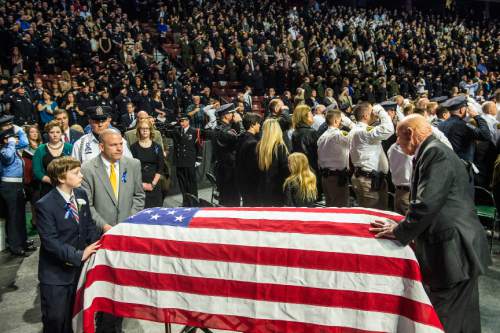This is an archived article that was published on sltrib.com in 2016, and information in the article may be outdated. It is provided only for personal research purposes and may not be reprinted.
Today the Utah Law Enforcement community honors 139 of its brothers and sisters killed in the line of duty since the 1847 arrival of Mormon pioneers.
At 11 a.m., more than 1,000 police officers and dignitaries will gather at the state Capitol to watch the most recent name in this tragic roll call added to the memorial by the family of Unified Police Officer Douglas S. Barney II, who was shot to death in January.
Doug would have been the 138th officer to be killed in the line of duty, but another name will be added ahead of his.
On April 11, 1953, Box Elder County Deputy Albert. L. May drowned in the Bear River while searching for the body of a missing man. His death was lost to time until it was recently discovered during ongoing historical research conducted by Utah Law Enforcement Memorial, Inc.
That was just a fancy way of saying that I found Deputy May's story. It happened entirely by accident. I came across the story of his death while reading old newspapers from the 1950s.
Deputy May is currently the 70th Utah police officer to be killed while serving the public. He'll remain No. 70 until research turns up another forgotten police officer killed before him, which seems highly likely given the haphazard manner in which the memories have been preserved.
Police weren't the only ones being killed in the line of duty back then, nor the only ones whose contribution to America has gone unnoticed. The early '50s was a brutal time for line-of-duty deaths for the military as well.
The Korean War was raging. There were a lot of Utahns risking life and limb to keep us safe. Nearly all of those killed are forgotten today.
Scattered among the newspaper advertisements — for new Kaiser automobiles, Wonder Bread, Speed Queen washing machines, Sears mink coats, giant 17-inch-screen TVs and an offer for $3 layaway on a .30-06 Enfield rifle at Zinik's — are the names of men who died to make capitalism possible.
Pfc. Robert J. Myers, from Delta, was killed fighting in the Kumsong area. Maj. Paul M. Nestler, Salt Lake City, was lost at Chosin Reservoir. His remains have never been recovered. Pfc. Desmond R. Wilkerson, of Midvale, was killed when his rescue chopper ran out of fuel and landed in North Korea. The entire crew was promptly killed by the North Koreans.
When looking for forgotten sacrifices here at home, it's impossible not to be drawn to the names of people who died to keep North Korea from being twice the size, considerably more powerful, and every bit as nuts as it is today.
Even worse are the families of Utahns who waited in vain for their loved ones to return or for news of what happened to them. The fates of many Utahns lost in the Korean War have never been determined.
There's a difference between the Korean War casualty list and Utah's list of fallen officers. The primary difference is that we know how many Utahns died in Korea, and that the war there is over.
Utah's list of fallen police officers is not complete, and it never will be. Unlike the casualty lists of other American conflicts, there's no end to the struggle for public safety.
Every police officer at today's Law Enforcement Memorial service have at least considered the possibility that they are paying their respects to a list of names that one day may include their own.
Robert Kirby can be reached at rkirby@sltrib.com or facebook.com/stillnotpatbagley



